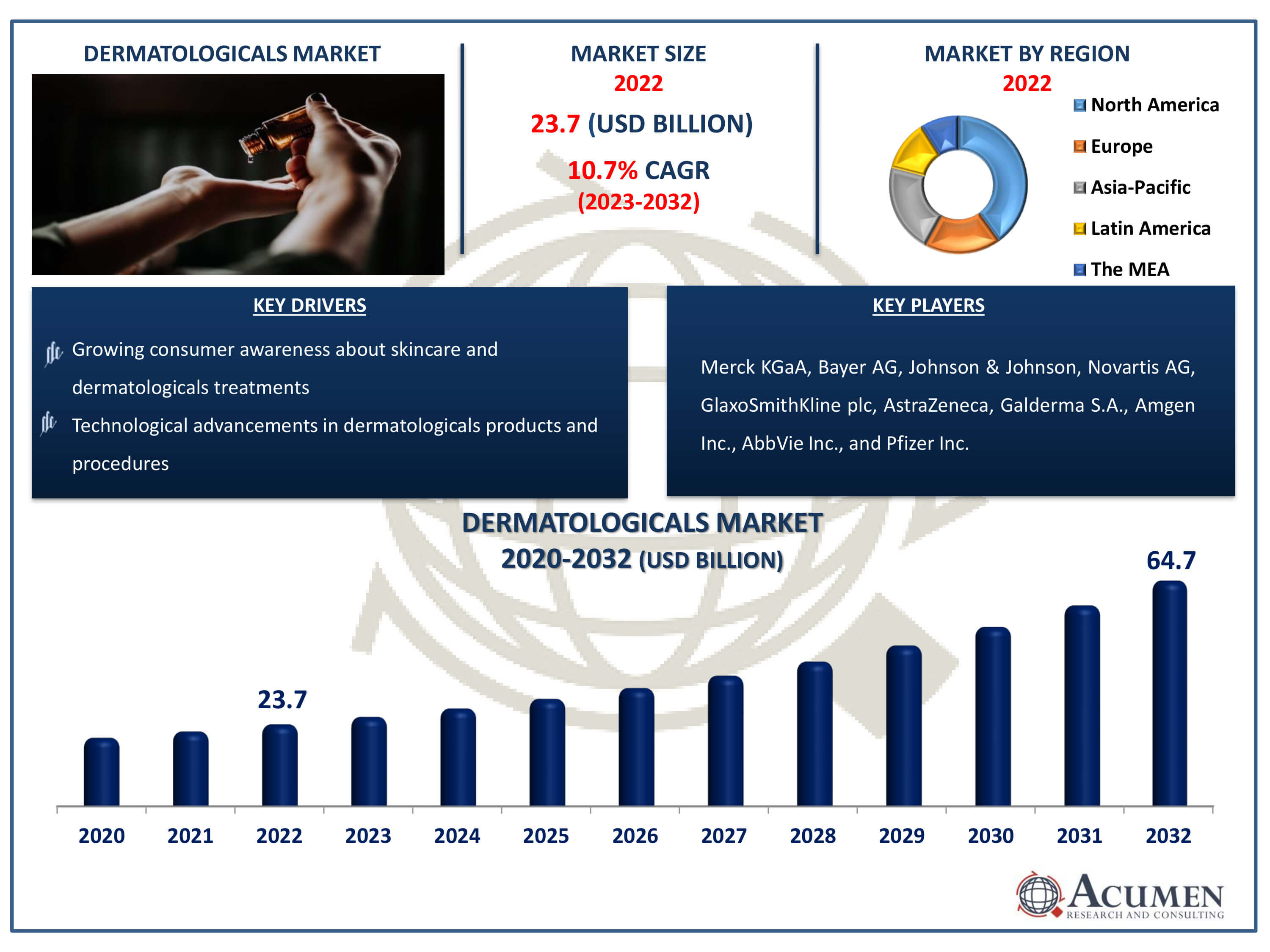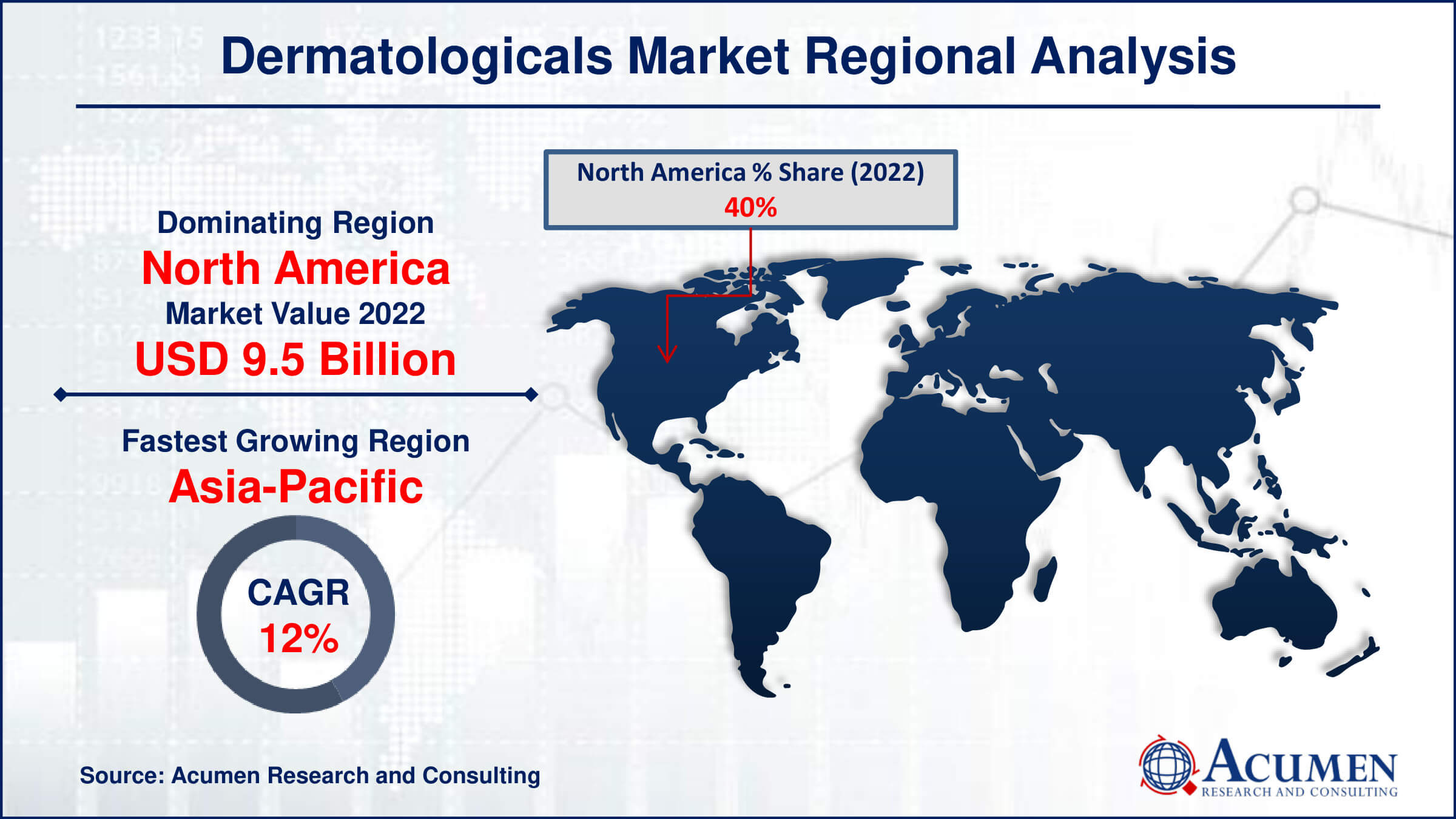Dermatologicals Market Size - Global Industry, Share, Analysis, Trends and Forecast 2023 - 2032
Published :
Report ID:
Pages :
Format :
Dermatologicals Market Size - Global Industry, Share, Analysis, Trends and Forecast 2023 - 2032
Report Coverage
- Industry Dynamics
- Market Size and Forecast Data
- Segment Analysis
- Competitive Landscape
- Regional Analysis with a Niche Focus on Country-Level Data
- High Level Analysis - Porter's, PESTEL, Value Chain, etc.
- Company Profiles of Key Players
- Option to Customize the Report As Per Your Specific Need
Request Sample Report
The Dermatologicals Market Size accounted for USD 23.7 Billion in 2022 and is estimated to achieve a market size of USD 64.7 Billion by 2032 growing at a CAGR of 10.7% from 2023 to 2032.
Dermatologicals Market Highlights
- Global dermatologicals market revenue is poised to garner USD 64.7 billion by 2032 with a CAGR of 10.7% from 2023 to 2032
- North America dermatologicals market value occupied around USD 9.5 billion in 2022
- Europe dermatologicals market growth will record a CAGR of more than 12% from 2023 to 2032
- Among drug type, the prescription-based drugs sub-segment generated more than USD 14.2 billion revenue in 2022
- Based on dermatological disease, the psoriasis sub-segment generated around 38% market share in 2022
- Integration of telemedicine and digital solutions for remote dermatologicals consultations and treatments is a popular dermatologicals market trend that fuels the industry demand

The market for dermatology includes goods and services meant to preserve and improve the health of the skin. Numerous dermatologicals diseases are addressed by this vibrant sector, including as psoriasis, acne, eczema, and skin ageing. The industry offers a range of medicines, over-the-counter medications, medical gadgets, and cosmetic procedures, with a rising focus on skincare and cosmetic dermatology. The industry is constantly expanding because to technological advancements, creative formulations, and dermatologicals research advancements. The global dermatologicals market is also expanding as a result of factors like growing disposable income, growing skincare awareness, and an ageing population. All things considered, the global dermatologicals market is vital to managing dermatologicals issues and advancing skin health.
Global Dermatologicals Market Dynamics
Market Drivers
- Increasing prevalence of skin disorders and conditions
- Growing consumer awareness about skincare and dermatologicals treatments
- Technological advancements in dermatologicals products and procedures
- Rising demand for cosmetic dermatology procedures
Market Restraints
- Stringent regulatory approval processes for new dermatologicals products
- High costs associated with dermatologicals treatments and medications
- Limited access to dermatologicals care in certain regions or populations
Market Opportunities
- Expansion of dermatologicals markets in emerging economies
- Development of novel treatments for unmet dermatologicals needs
- Growing demand for natural and organic skincare products
Dermatologicals Market Report Coverage
| Market | Dermatologicals Market |
| Dermatologicals Market Size 2022 | USD 23.7 Billion |
| Dermatologicals Market Forecast 2032 | USD 64.7 Billion |
| Dermatologicals Market CAGR During 2023 - 2032 | 10.7% |
| Dermatologicals Market Analysis Period | 2020 - 2032 |
| Dermatologicals Market Base Year |
2022 |
| Dermatologicals Market Forecast Data | 2023 - 2032 |
| Segments Covered | By Dermatological Disease, By Drug Type, By Route of Administration, And By Geography |
| Regional Scope | North America, Europe, Asia Pacific, Latin America, and Middle East & Africa |
| Key Companies Profiled | Merck KGaA, Bayer AG, Johnson & Johnson, Novartis AG, GlaxoSmithKline plc, AstraZeneca, Galderma S.A., Amgen Inc., AbbVie Inc., and Pfizer Inc. |
| Report Coverage |
Market Trends, Drivers, Restraints, Competitive Analysis, Player Profiling, Covid-19 Analysis, Regulation Analysis |
Dermatologicals Market Insights
A gradual increase in the number of patients suffering from skin-associated diseases, rising consumer awareness regarding dermatology, and a growing demand for treatments related to skin cancer, rosacea, alopecia, etc., are major factors expected to drive the growth of the global market. According to the American Cancer Society, Inc., about 5.4 million basal and squamous cell skin cancers are diagnosed each year in the US, with about 8 out of 10 being basal cell cancers. High government spending on the development of present infrastructure for R&D activities, coupled with the development of regulatory scenarios, are among the factors expected to support the growth of the target market.
Major players are focusing on business development activities through strategic mergers and acquisitions, which are expected to increase the customer base and enhance profit ratios, further augmenting the growth of the target market.
In 2020, Eli Lilly acquired Dermira, a dermatological drug developer, for US$ 1.01 billion. This acquisition is expected to help the company expand its product portfolio and increase profit ratios.
Additionally, governments, in collaboration with private players, are focused on introducing new products, which is expected to further support the growth of the target market to a certain extent.
In 2019, L'Oréal introduced AF Adapalene Gel, an over-the-counter product for the treatment of acne-prone skin. This is expected to increase the customer base and enhance the product portfolio.
In 2017, Merck and Pfizer, in collaboration, launched Bavencio in the UK market, the first medicine licensed for the treatment of the rare, aggressive skin cancer metastatic Merkel Cell Carcinoma (mMCC).
However, factors such as stringent government regulations related to product approval and the side effects of some drugs are expected to hamper the growth of the global market. Additionally, a lack of awareness in developing countries and limited availability of reimbursement policies are among other factors expected to challenge the growth of the target market. Advancements in drug development by major players and a focus on emerging economies to increase the customer base and enhance profit ratios are factors expected to create new opportunities for players over the forecast period. Additionally, high R&D activities and new product offerings are factors expected to support revenue growth in the target market.
Dermatologicals Market Segmentation
The worldwide market for dermatologicals is split based on dermatological disease, drug type, route of administration, and geography.
Dermatological Market by Dermatological Diseases
- Acne
- Dermatitis
- Psoriasis
- Skin Cancer
- Rosacea
- Alopecia
According to dermatologicals industry analysis, the psoriasis category has the most shares for a number of reasons. Psoriasis is a widespread, autoimmune skin illness that causes red, scaly patches that can be extremely painful and debilitating. It affects millions of people worldwide. The need for efficient management and treatment options for psoriasis is growing due to its rising prevalence around the globe. Pharmaceutical companies have made large expenditures in psoriasis therapy due to the expansion of the therapeutic landscape and the development of biologic medicines, targeted drugs, and new treatment techniques. Furthermore, increased access to dermatological care and rising psoriasis awareness among patients and healthcare professionals support the dominance of the psoriasis category in the dermatological market.
Dermatological Market by Drug Types
- Prescription-Based Drugs
- Over-the-Counter Drugs
Prescription-based drugs holds the largest share of the market and it is expected to grow over the dermatological industry forecast period due to many factors. Prescription medications are frequently necessary for treating dermatological problems because they call for customized treatment plans that are based on the needs of each patient. These drugs, which are usually recommended by dermatologists or other medical professionals, provide effective formulations and focused treatment for a range of skin conditions, such as eczema, psoriasis, and acne. Furthermore, in order to guarantee their efficacy and safety, prescription medications frequently go through stringent clinical testing and regulatory approval procedures. Prescription-based medicine demand is further increased by the possibility that some dermatological problems require prescription-strength treatments in order to get the best possible results. With skin disorders becoming more common and personalised medicine becoming more important, the Prescription-Based Drugs section of the dermatology market continues to lead and provide patients with necessary treatments all around the world.
Dermatological Market by Route of Administrations
- Topical
- Oral
- Parenteral Administration
For a number of reasons, the topical category leads the dermatological market. Topical drugs are a popular and practical method of treating dermatological disorders since they are administered directly to the skin's surface. They provide localized treatment for a variety of skin conditions, including psoriasis, eczema, and acne, by providing tailored therapy to the afflicted areas. Additionally, topical formulations are available in a variety of forms, such as lotions, ointments, gels, and creams, giving patients and clinicians more therapy options. Furthermore, the safety profile of topical drugs is improved because they often have fewer systemic side effects as compared to oral or parenteral delivery. The topical segment of the dermatological market continues to dominate due to its ease of use, efficacy, and low systemic exposure, serving the different needs of patients and healthcare professionals globally.
Dermatologicals Market Regional Outlook
North America
- U.S.
- Canada
Europe
- U.K.
- Germany
- France
- Spain
- Rest of Europe
Asia-Pacific
- India
- Japan
- China
- Australia
- South Korea
- Rest of Asia-Pacific
Latin America
- Brazil
- Mexico
- Rest of Latin America
The Middle East & Africa
- South Africa
- GCC Countries
- Rest of the Middle East & Africa (ME&A)

Dermatologicals Market Regional Analysis
In terms of dermatologicals market analysis, North America is the top region in the industry for a number of reasons. The region's dominance in the market is attributed to its sophisticated research facilities, well-established healthcare infrastructure, and high healthcare spending. The need for dermatological products and treatments is further fueled by the vast population in North America who suffers from a high prevalence of dermatological disorders such acne, psoriasis, and skin cancer. Furthermore, robust regulatory frameworks guarantee the effectiveness and safety of dermatological products, fostering trust between patients and medical professionals.
However, Asia-Pacific region is expanding at the quickest rate throughout the dermatologicals market forecast period from 2023 to 2032. Numerous causes, such as the fast urbanization rate, rising disposable incomes, and rising knowledge of skincare and dermatological therapies, are driving this expansion. The growing middle class population and increased incidence of skin illnesses in nations like China, Japan, and India fuel the market for dermatological products. In addition, the Asia-Pacific market is growing due to new dermatological therapies, pharmaceutical market expansion, and improvements in healthcare infrastructure. The Asia-Pacific area offers attractive prospects for dermatological enterprises seeking to enhance their market share and capitalize on the increasing demand for skincare and dermatological solutions in the region, given the region's expanding population and escalating healthcare expenses.
Dermatologicals Market Players
Some of the top dermatologicals companies offered in our report includes Merck KGaA, Bayer AG, Johnson & Johnson, Novartis AG, GlaxoSmithKline plc, AstraZeneca, Galderma S.A., Amgen Inc., AbbVie Inc., and Pfizer Inc.
Frequently Asked Questions
How big is the dermatologicals market?
The dermatologicals market size was valued at USD 23.7 billion in 2022.
What is the CAGR of the global dermatologicals market from 2023 to 2032?
The CAGR of dermatologicals is 10.7% during the analysis period of 2023 to 2032.
Which are the key players in the dermatologicals market?
The key players operating in the global market are including Merck KGaA, Bayer AG, Johnson & Johnson, Novartis AG, GlaxoSmithKline plc, AstraZeneca, Galderma S.A., Amgen Inc., AbbVie Inc., and Pfizer Inc.
Which region dominated the global dermatologicals market share?
North America held the dominating position in dermatologicals industry during the analysis period of 2023 to 2032.
Which region registered fastest CAGR from 2023 to 2032?
Europe region exhibited fastest growing CAGR for market of dermatologicals during the analysis period of 2023 to 2032.
What are the current trends and dynamics in the global dermatologicals industry?
The current trends and dynamics in the dermatologicals industry include increasing prevalence of skin disorders and conditions, growing consumer awareness about skincare and dermatologicals treatments, technological advancements in dermatologicals products and procedures, and rising demand for cosmetic dermatology procedures.
Which drug type held the maximum share in 2022?
The prescription-based drugs drug type held the maximum share of the dermatologicals industry.


